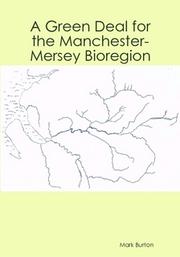Check nearby libraries
Buy this book

We are living in unprecedented times. At least three linked crises are coming together to threaten not only our accustomed standard of living and financial security, but also the resource base of the late 20th century economy and way of life, and the capacity and integrity of the earth’s natural systems on which we all depend. This conjuncture of crises requires urgent and drastic action that completely restructures the way we organise to produce and distribute the things we need to have worthwhile lives This has to be done fairly and sustainably. The following outline sets out a programme of action for the Manchester-Mersey bioregion. It argues that it is the bioregional level that provides the viable basis for a sustainable economy that can deliver well being for all, despite drastically reducing energy use. But this means replacing a strategy of competition in a global economy with one based on the principle of trade subsidiarity (strategic localism) and production for need.
The North West’s major city, Manchester, and the area around it has been variously identified and described as Greater Manchester, a city region and together with other areas (Lancashire, Cheshire and Merseyside) as the North West. It has been a dynamic region economically and is home to several million people (depending on where we draw the boundaries). Current economic orthodoxy sees its future development in terms of certain key sectors: advanced engineering and materials, biomedical, business and professional services, construction, creative and digital industries, energy and environmental technologies, food and drink . This all needs rethinking in the context of the triple crisis of climate change, decarbonisation/energy crunch, and the collapse of the financial / neoliberal accumulation regime. Because of the imperatives of reducing energy expenditure and (re)generating a real local economy it is at the regional level that transformative green strategies can make the most sense.
Check nearby libraries
Buy this book

Showing 1 featured edition. View all 1 editions?
| Edition | Availability |
|---|---|
| 1 |
aaaa
Libraries near you:
WorldCat
|
Book Details
Table of Contents
Edition Notes
ID Numbers
Excerpts
This conjuncture of crises requires urgent and drastic action- if it is already not too late – that completely restructures the way we organise to produce and distribute the things we need to have worthwhile lives, and do this fairly and sustainably.
The New Green Deal (NGD) pamphlet was issued in summer 2008 by the New Economics Foundation (NEF) . It was prescient given the accelerating impact and predictions of climate change and the deepening economic crisis resulting from the bursting of the financial speculative bubbles. NEF NGD identifies a the third problem area, the energy crunch....
The NEF NGD attempts to address this trio of threats in an integrated way. ... The NGD outlines a kind of green Keynesian approach: sustainable development with social justice. It fails to fully recognise that the trio of problems is the combination of the latest crisis in capitalist accumulation with the planetary limits to capitalism . But we can use it as a starting point for collectively planning for both resilience to shocks and also for a more adequate and sustainable approach to human development. This has to happen at local , regional, national and international levels. Key to this is the idea of a replacement economy to take the place of both the finance bubble economy and the economy of real production and distribution that is not only unsustainable but hurrying the ecosystem to destruction .
It gives a good idea of the context that the book addresses.
Links outside Open Library
Community Reviews (0)
Feedback?History
- Created November 14, 2010
- 6 revisions
Wikipedia citation
×CloseCopy and paste this code into your Wikipedia page. Need help?
| October 17, 2022 | Edited by ImportBot | import existing book |
| August 22, 2020 | Edited by ISBNbot2 | normalize ISBN |
| November 14, 2010 | Edited by 94.30.62.68 | Edited without comment. |
| November 14, 2010 | Edited by 94.30.62.68 | Added new cover |
| November 14, 2010 | Created by 94.30.62.68 | Added new book. |










